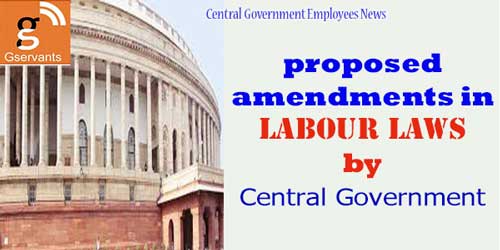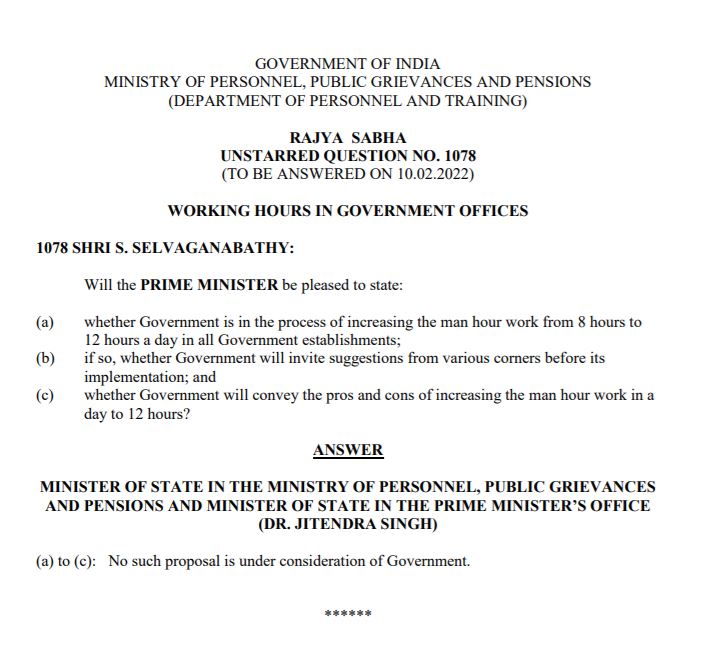Details of proposed amendments in Labour Laws by Central Government

GOVERNMENT OF INDIA
MINISTRY OF LABOUR AND EMPLOYMENT
LOK SABHA
UNSTARRED QUESTION NO 147
ANSWERED ON 24.11.2014
AMENDMENTS TO LABOUR LAWS
147 . Jayadevan Shri C. N., Kodikunnil Shri Suresh
Yadav Shri Dharmendra, Ram Mohan Naidu Shri Kinjarapu
Shrirang Shri Chandu Barne, Patil Shri Shivaji Adhalrao
Saraswati Shri Sumedhanand, Bhuria Shri Dileep Singh
Will the Minister of LABOUR AND EMPLOYMENT be pleased to state:-
(a) whether the Union Government and also some State Governments have proposed certain amendments in labour laws;
(b) if so, the details of the proposed amendments proposed by the Union and the State Governments separately along with the reasons therefor;
(c)the extent to which the proposed changes in the labour laws are likely to reduced hassles for employers and employees;
(d)whether the Government has also proposed for self-certification by the employer regarding the safety and security of the employees and of the people in and around the factory; and
(e)if so, the details thereof?
ANSWER
MINISTER OF STATE (IC) FOR LABOUR AND EMPLOYMENT (SHRI BANDARU DATTATREYA)
(a): Yes, Madam.
(b): The details of the amendments proposal by the Union Government are at Annexure-I.
The details of amendment proposals received from State Governments for seeking concurrence are at Annexure-II.
(c) to (e): Review/updation of labour laws is a continuous process in order to bring them in tune with the emerging needs of the economy after tripartite consultations amongst Government, Employers’ & Employees’ Organizations. While undertaking such changes overall interests of labour like wages, employment, social security, working environment, health and safety etc. are protected keeping in view the requirements of the Indian Industry to make it efficient and internationally competitive. This constitutes an essential part of labour reforms which essentially means taking steps to increase production, productivity and employment opportunities in the economy.
The Ministry of Labour & Employment is also proactively engaged in addressing the issues related to multiplicity of labour laws and the ease of compliance to promote an enabling business environment.
A single unified Web Portal has been developed for Online Registration of units, Reporting of inspections, and submissions of Annual Returns and redressal of grievances. This portal facilitates ease of reporting at one place for various Labour Laws by a single online annual return; consolidate information of Labour Inspection and its enforcement thereby enhancing transparency in Labour Inspection as well as that in monitoring of Labour Inspections.
Annexure-I
The Child Labour (Regulation & Abolition) Act, 1986
- Linking the definition of child under this Act to that under the Right to Education Act, 2009,
- complete prohibition on employment of children below 14 years and linking the age of the prohibition with the age under Right to Free and Compulsory Education Act,
- prohibition of working of Adolescents in Mines, Explosives and hazardous occupations set forth in the Factories Act, 1948,
- More strict punishment to the offenders and making the offences under the Act cognizable.
The Factories Act, 1948
- The threshold limit for coverage under the Factories Act as defined in Section 2(m), is proposed to be amended to include besides the existing limits of 10 workers (for units with power) and 20 workers (for units without power), units with such number of workers as may be prescribed by the State Government with a cap of 20 workers (for units with power) and 40 workers (for units without power) respectively. This will provide flexibility to the State Governments to amend their State Law as per their requirements.
- Amendment of Section 66 of the Act relating to permission for employment of women for night work for a factory or group or class or description of factories with adequate safeguards for safety and provision of transportation till the doorstep of their residence.
- Amendment of Sections 64 and 65 of the Act to enhance the limit of overtime hours from the present limit of 50 hours per quarter to 100 hours per quarter. The amendment also proposes this limit to be increased to a maximum of 125 hours per quarter in public interest with the approval of State Government.
- Insertion of provision relating to compounding of certain offences (Section 92 C and new Fourth Schedule) and amendment of Section 92 of the Act enhancing the quantum of penalty for offences.
- The provision of self-certification has been introduced for the purpose of expansion of the factory through amendment in Section 6.
- Provision of empowering the State Government to increase the period of spreadover from 10.5 hours to 12 hours (Section 56) through notification in the Official Gazette.
- Introduction of a new Section 35A on provision of personal protective equipment for workers exposed to various hazards and amendment of Sections 36 and 37 regarding entry into confined spaces and precautions against dangerous fumes, gases etc.
- Provision of canteen facilities in respect of factories employing 200 or more workers instead of the present stipulation of 250 workers (Section 45) and also provision of shelters or restrooms and lunchrooms in respect of factories employing 75 or more workers instead of the present stipulation of 150 workers (Section 47).
- Introduction of new terms like “hazardous substance” and “disability” to existing definitions (Section 2cc. 2ea)
- Prohibition of employment of pregnant women (it was earlier for all women) and persons with disabilities on or near machinery in motion and near cotton openers (Section 22 (2)).
- Reduction in the eligibility criteria for entitlement of annual leave with wages from 240 days to 90 days (Section 79).
- Presently only the State Governments are empowered to make rules under the Factories Act. It is now proposed to empower the Central Government also to make rules under the Act on some of the important provisions.
The Mines Act, 1952
- Amend the “long title” so as to provide that “the regulation of conditions of work, health and welfare of persons employed in mines”,
- Substitute the definition of owner so as to make it more comprehensive;
- Define “foreign company” with reference to the Companies Act, 1956;
- Make provisions for appointment of officials in addition to agents of the employer in the mines;
- Increase the penalties provided in sections 63 to 70, sections 72A, 72B, 72C and 73 and also to shift the burden of proof upon the person who is being prosecuted or proceeded against to prove that it was not reasonably practical, o, all practical measures to satisfy the safety requirements; and Amend section 76 so as to enlarge the scope to cover the foreign companies and to insert a new section 76 A to provide that the person who has actual ultimate control over the affairs of the mines would continue to be liable for the contravention of the provisions of the Act or of any rule or regulation or by law or order made there under.
Minimum Wages Act, 1948
- Statutory recognition of National Floor Level Minimum Wage (NFLMW) and to make it applicable to all employments and removing the restriction of 1000 or more workers for an employment to come within the purview of Minimum Wages Act.
- Review and revision of NFLMW at intervals not exceeding five years, besides, a component of variable dearness allowance will be worked out on the basis of rise in consumer price index for industrial workers every six months.
- Making applicable NFLMW in respect of an employment where no minimum wages has been fixed by both State and the Centre Government.
- Review and revision of the minimum rates of wages at intervals not exceeding five years, if the minimum wages has a component of variable dearness allowance worked out on the basis of rise in consumer price index for industrial workers, and in any other case at the interval of two years.
- Fixing the minimum wage not below the NFLMW and, where there is variation between the rates of minimum wages and NFLMW, to make applicable the higher of the two.
- Giving wage cards to the employees by employers, in addition to wage books and wage slips as part of the maintenance of records.
- Accepting claims regarding minimum wages, within 12 months, instead of existing time period of six months.
- Enhancing the fine prescribed for contravention of certain provision of the Act from Rs.500/- to Rs.5000/- on first conviction and with imprisonment for a term which may extend to one year or with fine of not less than Rs.5000 extending up to Rs.10,000 in the case of second or subsequent conviction.
- Enhancement of compensation payable to the workers and measures to streamline the enforcement provisions.
- Making applicable in Central Sphere, the minimum wages fixed by the State Government in respect of particular employment, where no minimum wages have been fixed by the Central Government.
- Making applicable in Central Sphere, the higher minimum wages fixed by the State Government in respect of a schedule employments where the minimum wages fixed by the Central Government is lower.
- Amend the definition of the “Appropriate Government”.
The Labour Laws (Exemption from Furnishing Returns and Maintaining Registers by Certain Establishments) Act, 1988
- Extending the coverage of the Principal Act from 9 Scheduled Acts to 16 Scheduled Acts as had been proposed in the 2005 Bill,
- Continuing with the existing method of defining establishments as ‘very small’ and ‘small’ with the change that the ‘small’ establishments would now cover the establishments employing between 10 to 40 workers as against the existing provision of 10 to 19 workers,
- The small establishments will be required to maintain two registers as against the existing provision of maintaining three registers,
- Allow maintaining of registers or records in computer, floppy, diskette or on other electronic media and submitting return through e-mail as had been proposed in the 2005 Bill.
Annexure-II
State Legislation – Amendment proposals of Government of Rajasthan
1. The Industrial Disputes Act, 1947 (2-A):- In case of dismissal, discharge, retrenchment or termination of an individual workman, for raising the industrial dispute 3 years limitation period is proposed.
The provision of 3 years limitation period for raising the Industrial Dispute already exists in the ID Act, 1947. Section 2A(3) was inserted vide amendment of 2010, providing limitation of period of 3 years from the date of dismissal, retrenchment, discharge for making the application to the Labour Court/Tribunal.
2. The Industrial Disputes Act, 1947 (9 D – Rajasthan Amendment). For the purpose of recognition of the trade union, the membership of the trade union is proposed to increase from 15% to 30%.
The Government of Rajasthan only amended the Industrial Disputes Act, 1947 in 1958 and inserted a provision for registration of the representative union. Similar provision do not exist in the Central Act. Ministry of Labour of Employment has no objection to the proposed amendment for increasing membership of union from 15% to 30% for the purpose of registering as representative union.
3. The Industrial Disputes Act, 1947 (25-K). For applicability Chapter V-B i.e. Pre-conditions of permission from the appropriate government, notices, compensation for lay off, retrenchment, closure, it is proposed to increase from 100 to 300 workmen. However, State Govt. can also apply provisions of Chapter V-B to an establishment in which less than 300 but not less than 100 workmen are employed.
For applicability of Chapter V B of Industrial Disputes Act, 1947 i.e. Pre- conditions of permission from the appropriate government, notices, compensation for lay off, retrenchment, closure, 100 or more workmen is required.
In the year 1984 by amendment of the Act, for applicability of Chapter V B, the limit of number of workmen were reduced from 300 to 100 for giving statutory protection to workmen of smaller establishments. The trade unions will strongly oppose the proposal of Rajasthan Government for increasing the number of workmen from 100 to 300. It is also not clear whether tripartite consultations have taken place as required under ILO Convention 144.
4. Industrial Disputes Act, 1947[25-N (1) (a)]: 3 months’ notice or wages in lieu of notice period is required to be paid before retrenchment or closure. It is proposed to delete the wages in lieu of notice period.
The proposal for removing the wages in lieu of the 3 month’s notice in case of retrenchment or closure, and making three months notice compulsory, the Ministry of Labour & Employment has no objection to this proposal.
5. Industrial Disputes Act, 1947 [25-N (9)]: In case of retrenchment in addition to the prescribed compensation i.e. 15 day’s wage for each completed year of service. It is proposed to pay to three months average pay to Workman.
The proposal is to provide additional financial security to the retrenched workmen in addition to the compensation prescribed in Section 25-N (9) of the Industrial Disputes Act, 1947. The Ministry of Labour & Employment has no objection to this proposal.
6. Industrial Disputes Act, 1947 {25-O(8)} In case of closure in addition to the prescribed compensation i.e. 15 day’s wage for each completed year of service. It is proposed to pay to three months average pay to Workman.
The proposal is to provide additional financial security to the retrenched workmen in addition to the compensation prescribed in Section 25-O (8) of the Industrial Disputes Act, 1947. The Ministry of Labour & Employment has no objection to this proposal.
7. The Industrial Disputes Act, 1947 Para 5 of part II of the fifth schedule i.e. unfair labour practices related to “go slow”. Proposed to define “go slow”.
The Ministry of Labour & Employment has no objection to the proposal to define “go slow”.
8. The Contract Labour (Regulation & Abolition) Act, 1970 Section 1(4)(a) & (b). For applicability of the Act, the number of workmen is proposed to increase from 20 to 50.
The two days strike notice by all CTUOs included the issue to protect the interest of contract labour. If the number of workmen increased from 20 to 50 for applicability of the Act, a large number of contract labour would be deprived from the benefits/protection provided in the Act. Since the issue of contract labour is frequently raised by all the CTUOs, they will strongly oppose this proposal. It is also not clear whether tripartite consultations have taken place as required under ILO Convention 144.
9. The Factories Act, 1948 Section 2(M)(I). Proposal is to increase from 10 to 20 workers with the aid of the power for the purpose of definition of factory.
The Factories Act, 1948 provide for the health, safety and welfare of the workers. In the absence of any other alternative provision, just taking out the workers from the Factories Act is likely to be opposed by the trade unions. It is also not clear whether tripartite consultations have taken place as required under ILO Convention 144.
10. The Factories Act, 1948 Section 2(M)(II). Proposal is to increase from 20 to 40 workers without the aid of power for the purpose of definition of factory.
The Factories Act, 1948 provide for the health, safety and welfare of the workers. In the absence of any other alternative provision, just taking out the workers from the Factories Act is likely to be opposed by the trade unions. It is also not clear whether tripartite consultations have taken place as required under ILO Convention 144.
11. The Factories Act, 1948 Section 105. Power of Inspector for launching the prosecution is proposed to be the power of the State Government i.e. no prosecution can be launched without the previous sanction of the State Government.
The Ministry of Labour & Employment has no objection if the prosecution can be launched with the prior sanction of the State Government.
12. The Factories Act, 1948 Section 106 – Proposed for the compounding of the offences.
The Ministry of Labour & Employment has also proposed for the compounding of the offences in its amendment, hence, has no objection to this proposal.
Source: loksabha.nic.in

